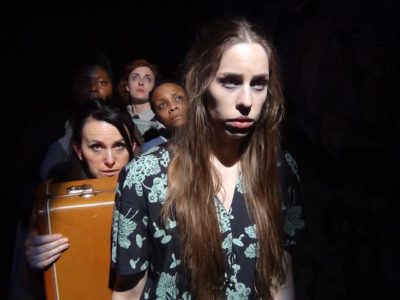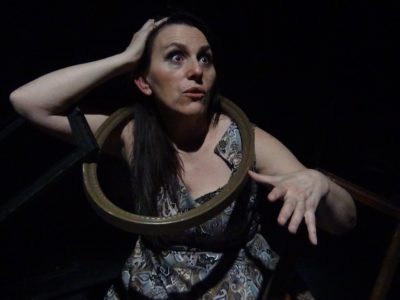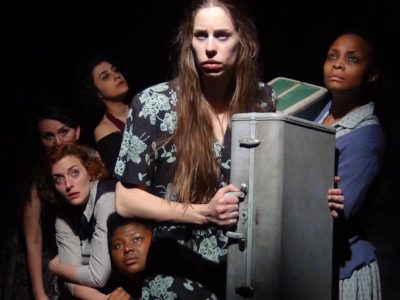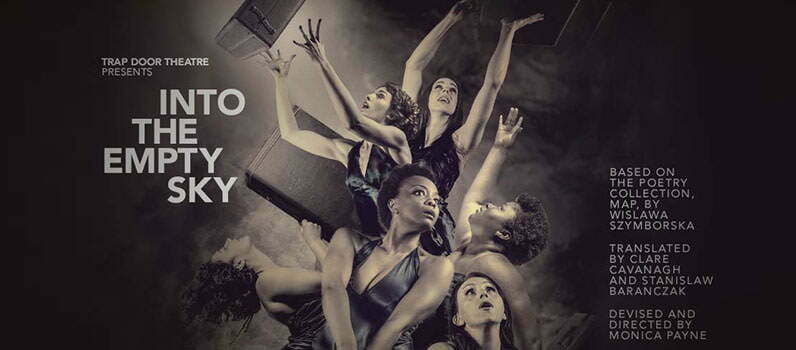Into the Empty Sky
Devised & Directed by Monica Payne.
Based on the poetry collection MAP by Wislawa Szymborska.
Translated by Clare Cavanagh and Stanislaw Baranczak.
Produced by Trap Door Theatre, Chicago.
“We know ourselves only as far as we’ve been tested.”
A Visual and Audial Poetic Experience.

To conclude their 23rd Season, Trap Door Theatre has enlisted Director Monica Payne to devise an experimental piece based on a collection of poetry by Polish-born Nobel Laureate Wislawa Szymborska (1923–2012). The press synopsis describes it as “six women trapped in a purgatorial landscape; unsure of their surroundings; haunted by the past, and trying desperately to escape”—but as frequenters of this company know, this terse synopsis barely scratches the surface of what’s in store once you pass through the trap door.
The production begins with a droning note casting its dull sense of dread into an empty walled by jagged rocks. Mike Mazzocca—the composer and atmospheric musician extraordinaire—tinkles the keys of a xylophone and brushes a cymbal as six women with suitcases circle-up on-stage to begin a series of bizarre, repetitive gestures suggesting their emotional and psychological personae. That’s just the first minute—and where it goes from there is an experience only unmediated witness can maintain: the marriage of poetry, sound, lighting, physical expression, and acting bears no second-hand account.
What I can relay is that many of Trap Door’s hallmarks play prominently in this production. Music, as I’ve mentioned above, contributes an important role here: together with the beautifully moody lighting (by Richard Norwood), the two practically serve as the spine on which the poetry intermittently bursts forth like the ribs of a desiccated corpse, each syllable an impulse towards reincarnation. Then, adding somatic rhythm, the actresses convulse and gesture like conduits of the otherworldly, musical landscape—like bodies seized and tormented by memories and actions of a former life.

Coming last upon this chain of expression, the poetry. I myself am not at all familiar with Wislawa Szymborska’s poetry, but based on what I heard—orientated to the music and setting—I felt a pall of war clouded these six lives, and everything they spoke of—much of which was in reference to what each hid within their luggage—seemed robbed from lives decimated by war: the suit jacket of a lover; picture frames of a younger self; discarded shoes of fallen refugees; etc. These stories and others receive a brief and evocative recital.
There is a thin structure to the piece, as the press description suggests, but it seemed relevant only as a kind of premise, by virtue of which we might experience Szymborska’s poetry in a particular attunement. I myself conceived the piece as a living triptych, since the actresses announce the titles of three “panels” throughout the show: “Shell Shock,” “Memory Rising,” and “Flight.” I wouldn’t say this tied it all together for me, but it’s an intriguing perspective from which to ponder the production as a whole.

As far as the performances go, it’s difficult to judge such an esoteric piece of art, particularly when the subject matter itself is poetic. But anyone who has ever seen a bad production of experimental theatre knows that, by God, one definitely knows when they’re sitting in on one of those. Fortunately, that’s never to be found at Trap Door. All the actresses exhibit an embodied commitment to the reality of the production. The stand-out performances, I noted, were experienced Trap-Dôrsists Halie Ecker, Marzena Bukowska, and Kelsey Rhiann Shipley: their presence had that sine qua non quality—in their physical movements; the credulity in their eyes; and, most especially, the expressive skill of their voices that transcended the “poetry” of the poetry to communicate its meaning clearly (cf. a coherent Shakespearian actress).
As always, a recommendation to see a Trap Door production comes with a slight qualification: this ain’t The Goodman main stage: think all the parodies you’ve ever seen of experimental theatre—now imagine them actually being sophisticated and engrossing, because even at its most esoteric, this piece was just that. That said, I think there’s more to get out of it than I did: in this case, the power of the poetry might depend on the experience you bring to it; I myself felt there was some unspecifiable something missing that would really register the pathos in my gut. Nevertheless, even a novice poet like myself could recognize and appreciate the beauty of Into the Empty Sky.
Recommended.
August Lysy.
Playing at Trap Door Theatre, 1655 West Cortland Ave., Chicago. Tickets are $20 – $25, with 2-for-1 tickets on Fridays. For tickets and information, call 773-384-0494, or visit TrapDoorTheatre.com. Performances are Thursdays-Fridays, and Saturdays at 8:00 p.m. through June 17th. Running time is 70 minutes with no intermission.

